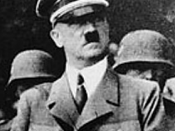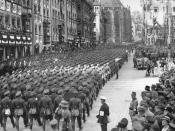Leni Riefenstahl was an amazing woman who lived an amazing life. Few would argue that her artistic beginnings paved the way for such a talented performer, actress, film-maker and photographer. However, her career has been tainted somewhat with controversy: consistently and unfairly associated with the evils of Hitler and the Nazi Party.
Leni Riefenstahl was not a Nazi, nor did she deserve such a label and interrogation as a "nazi-sympathiser" in the form of de-nazification after the war. It is an issue that is often discussed in many sources.
"No words of anti-Semitism ever passed my lips, nor did I write any. I was never anti-Semitic and never joined the Nazi Party. So what am I guilty of, tell me that?" - Leni Riefenstahl.
Her job was to make films for Hitler, which she did successfully, but were her films documentaries, Nazi propaganda, or something else?
There are two dominant definitions of the term propaganda.
The first is clearly more acceptable and widestream (in today's thriving media environment) than the second, and they contrast with each other somewhat. The public perception of the term is assumed somewhere in the middle of the two.
1. information or publicity put out by an organization or government to spread and promote a policy, idea, doctrine, or cause
2. deceptive or distorted information that is systematically spread
Nothing was staged in Riefenstahl's films for the Nazi Party, and every piece of footage is an accurate and precise perception of what was going on at the time, as a quote from Riefenstahl herself reveals, from Ellen Cheshire's film analysis of Triumph of the Will:
"If you see this film again today you ascertain that it doesn't contain a single reconstructed scene. Everything in it is true. And it contains no tendentious commentary at all.



Thanks
...for the essay, and particularly the biblio., will come in handy.
2 out of 3 people found this comment useful.